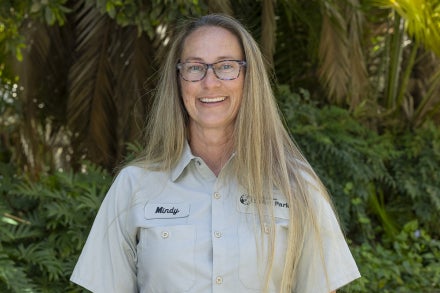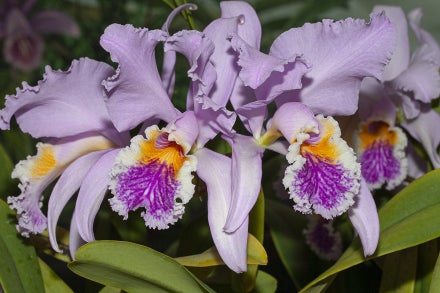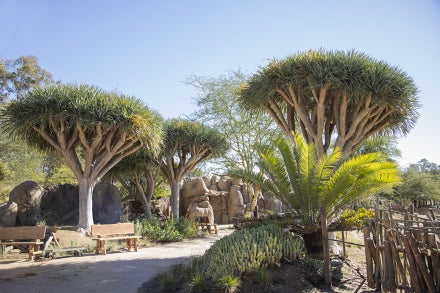
The vibrant tropical forests throughout the idyllic islands of Fiji and Tonga are home to an exceptional iguana. Using their vivid green and blue coloring to seamlessly disappear into the surrounding vegetation, critically endangered Fiji iguanas are suited for a life in the treetops. While this helps keep them safe from predators, they unfortunately can’t hide from increasing threats to their survival, including wildlife trafficking, deforestation, and competition from invasive species.
For over 60 years, we’ve worked with partners to save, protect, and care for this beautiful and intriguing species. You might have even encountered them at the San Diego Zoo’s Wildlife Explorers Basecamp—if you were lucky enough to spot one camouflaged in the treetops. And today, tucked away in a private area behind the scenes, there is an even larger group of Fiji iguanas, one which we just started caring for after a harrowing adventure. Tapping into our decades of experience, we collaborated to rescue them from illegal wildlife trafficking in Spain. Our conservation work, both at the Zoo and through our Pacific Islands Conservation Hub, has led us to pivotal moments like this, where we put our expertise into action to secure a brighter future for wildlife.
Rescuing Fiji’s Icons
Our long history of conserving these iguanas began when Fiji first entrusted us with them in 1965. Since then, we’ve become a haven for Fiji’s national treasure. In the 1990s, we pioneered an Association of Zoos and Aquariums’ (AZA) Species Survival Plan Program for Fiji iguanas, focusing on long-term conservation solutions. Today, we care for the largest and most successful conservation breeding colony of this critically endangered species outside of Fiji, and each individual is crucial to their global population. Additionally, because of the trust we share with our Fijian partners, we manage every Fijian iguana cared for by our fellow AZA-accredited institutions across the United States. These successes prepared us to rise to the occasion and do our part when the call came for this rescue mission.
In 2017, more than 600 illegally trafficked reptiles were seized in a confiscation by the Spanish authorities, including a group of Fiji iguanas. “Confiscations of trafficked wildlife happen a lot more frequently than people realize, and reptiles are especially susceptible due to their high demand in the illegal pet trade,” said Brett Baldwin, curator of herpetology and ichthyology at the San Diego Zoo.
After the eight Fiji iguanas were rescued, discussions arose about the best course of action for their future. Providing long-term care for the reptiles in Spain wasn’t feasible, and since little was known about their origins they couldn’t be returned to native habitats. Over the next eight years, we worked with our partners in both Fiji and Spain to bring the rescued iguanas to San Diego. As Brett puts it, when it comes to trafficked wildlife, “Whether it’s within our borders or across the world, we’re ready to answer the call for help.” We are honored to be able to give these trafficked iguanas a new home at the Zoo.
World-Class Care
Once it was finally time, our teams jumped into action to ensure the iguanas’ health and safety throughout the long journey to California. Moving endangered wildlife halfway across the world requires meticulous planning and coordination between countless collaborators. One of our experts even flew to Spain to prepare the iguanas for their journey and to make sure everything was in order.
“After years of collaboration with partners in Spain and the National Trust of Fiji, it’s incredibly rewarding to welcome these iguanas into our care,” said Brandon Scott, wildlife care manager of herpetology and ichthyology at the San Diego Zoo. Upon arrival, it was all hands on deck as our Wildlife Care, Wildlife Health, and Conservation Science teams came together to assess the iguanas. This multi-pronged approach included full health examinations to help ensure each individual can thrive.
One unique challenge in welcoming rescued wildlife is that often, little is known about their history and the specific areas they are from. With the help of our Conservation Genetics team, we’ll be able to answer some of these questions. Routine genetic testing can fill in the blanks on information we’d otherwise never be able to discover, such as the iguanas’ species, the group’s genetic diversity, and their potential islands of origin—including whether they were likely trafficked directly from their native habitats in Fiji or illegally bred. Every clue our experts uncover about these iguanas’ mysterious past leads to increased understanding of the species as a whole, helping conservationists secure a more sustainable future so they can thrive long-term.
A Promising Future
Wildlife trafficking is one of the biggest threats facing countless species around the world, including Fiji iguanas. This illegal trade in turn disrupts the ecosystems wildlife rely on, pushing many already vulnerable species closer to the edge of extinction. To address wildlife trafficking at its source, our teams collaborate with international conservation partners to safeguard healthy and delicately balanced ecosystems here in San Diego and around the world. At the San Diego Zoo and San Diego Zoo Safari Park, we use education and advocacy to raise awareness about the devastating impacts of the illegal trade and inspire others to protect wildlife for generations to come.
After an incredible journey, this special group of Fiji iguanas is settling in at the Zoo. Their remarkable story is one of resilience, hope, and a fresh start—and it’s only just beginning. The iguanas’ rescue is a powerful reminder that when we come together with expertise, collaboration, and perseverance, we can achieve anything. With the help of wildlife allies like you, we’re making a difference for vulnerable and endangered species across the globe.
Discover how you’re making a difference for Fiji iguanas and other fascinating wildlife through our Pacific Islands Conservation Hub. Then test your skills on your next visit to Wildlife Explorers Basecamp and search among the treetops for these iconic iguanas.










